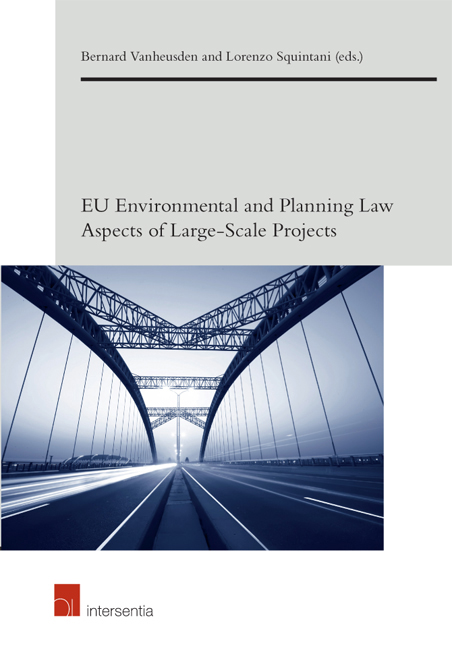Book contents
- Frontmatter
- Contents
- Introduction
- Part I General
- Chapter 1 Environmental Aspects of State Aid for Energy Investment Projects
- Chapter 2 The New 2014 Regulation on Noise-Related Restrictions at EU Airports Help or Hurdle to Noise Management?
- Chapter 3 The EU and the Participation of Civil Society in Large Projects
- Chapter 4 From Host to Investor: Enhancing the Sustainability of CDM Forest Carbon Projects
- Part II Public Participation
- Part III Environmental Impact Assessment
- Part IV Water
- Part V Nature
- Part VI Land Use
- Conclusion: Reconciling Conflicting Values: A Call For Research on Instruments to Achieve Quasi-Sustainability
Chapter 2 - The New 2014 Regulation on Noise-Related Restrictions at EU Airports Help or Hurdle to Noise Management?
from Part I - General
Published online by Cambridge University Press: 21 September 2018
- Frontmatter
- Contents
- Introduction
- Part I General
- Chapter 1 Environmental Aspects of State Aid for Energy Investment Projects
- Chapter 2 The New 2014 Regulation on Noise-Related Restrictions at EU Airports Help or Hurdle to Noise Management?
- Chapter 3 The EU and the Participation of Civil Society in Large Projects
- Chapter 4 From Host to Investor: Enhancing the Sustainability of CDM Forest Carbon Projects
- Part II Public Participation
- Part III Environmental Impact Assessment
- Part IV Water
- Part V Nature
- Part VI Land Use
- Conclusion: Reconciling Conflicting Values: A Call For Research on Instruments to Achieve Quasi-Sustainability
Summary
INTRODUCTION
Noise and airports: this is a long story, especially in Europe. A story about how to reconcile the general interest linked to the use of air space with the rights of those who suffer the consequences of the noise emissions that are generated during take-off and landing. Aircrafts are noisy vehicles indeed and they often generate nuisances when flying at low heights. Member States have for long been faced with that issue, which is particularly critical when airports are not ideally located, by being much too close to heavily populated urban areas. As a consequence, many States have already developed substantial mandatory measures aimed at avoiding or mitigating noise due to airport activities, with more or less success. Due to an ever-increasing public sensitivity, case-law is flourishing, both internally and internationally, around issues of human rights, of home protection and of the protection of a healthy environment, in relation to day and night flights.
To a point that, from another point of view, noise-related measures have turned out to be seen as a threat to airport development and even as the possible cause of capacity shortage in Europe. A very topical subject in 2014, in that very regard, is the adoption of a new Regulation aimed at revising the rules on restricting operations at an EU airport because of noise, Regulation (EU) No 598/2014 of the European Parliament and of the Council of 16 April 2014 on the establishment of rules and procedures with regard to the introduction of noiserelated operating restrictions at Union airports within a Balanced Approach. The new regulation, which is based on the Transport Title of the Treaty on the Functioning of the European Union, shall enter into force on 13 June 2016.
This contribution proposes an insight into that Regulation, which nicely fits the general theme of the present book on Environmental and Planning Law Aspects of Large-Scale Projects. After an introduction (1. Introduction), the first section explains the content and recent modifications of the current framework, while paying attention to the influence of the International Civil Aviation Organization in that evolution (especially through the notion of ‘balanced approach’) and to relevant case-law at European Union level (2. Current framework).
- Type
- Chapter
- Information
- Publisher: IntersentiaPrint publication year: 2016



